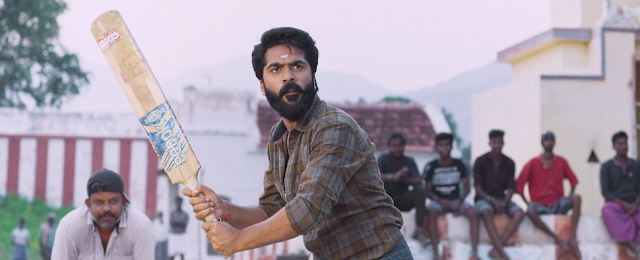The Good Servant is a stock character in Indian cinema. He (it's always a he) is completely dedicated to his employer, and will do anything to protect the family, even when the employer's ungrateful children inevitably conspire to throw the Good Servant out of the house. The nice thing about tropes is they let you assemble a story quickly in order to reflect current trends, and that's certainly the case with Eeswaran (2021).
Twenty five years ago, Paapathi (Vinodhini Vaidyanathan) died suddenly, a death which was predicted by astrologer Kaali (Kaali Venkat.) Her husband, Periyasamy (Bharathiraja), raises the children as best he can. Eventually, the children all move to Chennai for work, and after a dispute involving an unpaid loan, they stop visiting.
Periyasamy isn't alone, though. He has Eeswaran (Silambarasan) to help run the (rather extensive) family farm and act as servant, personal caretaker, and devoted companion. Eeswaran has the hypercompetent swagger you'd expect from a South Indian movie hero. He's charming, popular, blessed with a particular gift for beating bad people up, and so confident that he's willing to Casey at the bat during the finale of a cricket game.
Every year Perivasamy holds a feats and performs ceremonies to honor his late wife, and every year the children make excuses and don't come. This year is special, though, because it's 2020, and India is about to lock down to slow the spread of COVID-19. Nobody wants to be cooped up in a small apartment in the city, so the children, and their children, and assorted family hangers-on all make their way to the family farm.
There are three major complications to the happy family reunion. The first is Vasuki (Nandita Swetha), one of Perivasamy's granddaughters and Eeswaran's ex-girlfriend. She left Eeswaran when he made it clear that he would not leave Perivasamy, and certainly wasn't interested in moving to Chennai to make money. Vasuki is now married to someone else, and while Eeswaran is carrying a bit of a torch, he's keeping his social distance. However, Vasuki's sister Poongodi (Nidhhi Agerwal) has decided that she wants Eeswaran, and she's not going to give up, even though he tries to make it clear that his situation has not changed.
The second complication is Kaali, the astrologer, who visits the farm and predicts that someone at the farm is going to die within ten days. Everybody is worried, especially after some of the sons and sons-in-law hang out unmasked at a village festival and share a bottle with a local who is COVID positive. The entire family gets tested, and they all test negative, but the doctor takes Eeswaran aside and tells him that thirteen year old Diya has a hole in her heart. Eeswaran decides to arrange for her treatment himself, and doesn't tell the family about her condition for stupid reasons.
And the third complication is Rathnaswamy (Stun Shiva), Perivasamy's old enemy, who has just been released form prison, and who is determined to prove Kaali's prediction wrong by killing the entire family rather than just one person. Eeswaran has to defeat a small army of goons, sort out his own love life, catch a handful of snakes, and punch destiny in the face, and maybe clear up that whole loan business and reunite the family while he's at it. It's all in a day's work for the Good Servant.
Except that Eeswaran is not just the Good Servant. Secretly, he's Perivasamy's long-lost son, which adds a bit of extra motivation for our hero (and makes the romantic subplot incredibly awkward) but otherwise doesn't impact the story at all. This is a movie with a lot more plot than the story really needs; trim a few extraneous plot points and the story would still hit the exact same beats. That includes the global pandemic, which is only important when it's important. Yes, everybody has to get COVID tests, but the entire extended family also squeezes into a single hospital room near the end and absolutely nobody is wearing a mask. It's a missed opportunity.



























